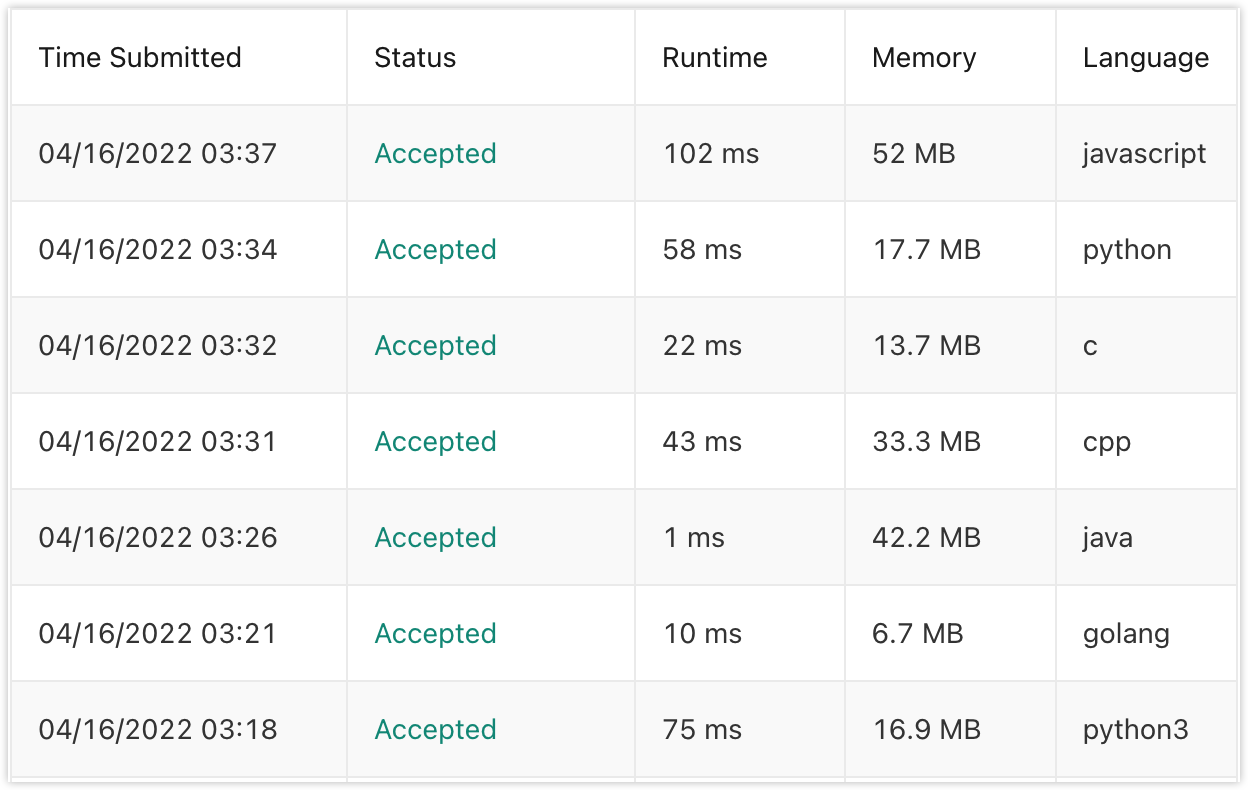[TOC]
My Solution
My thinking process while tackling this problem is in the method docstring.
Given number of nodes =
Time Complexity:
- One traversal
Space Complexity:
- No extra space used for storing tree
- Recursion takes space. Each recursive call costs constant space.

Python
Runtime: 75 ms, faster than 98.41% of Python3 online submissions for Convert BST to Greater Tree.
Memory Usage: 16.9 MB, less than 29.01% of Python3 online submissions for Convert BST to Greater Tree.
# Definition for a binary tree node.
# class TreeNode:
# def __init__(self, val=0, left=None, right=None):
# self.val = val
# self.left = left
# self.right = right
class Solution:
def convertBST(self, root: Optional[TreeNode]) -> Optional[TreeNode]:
"""
The left children will be updated based on accumulated values on the right children
To make the algorithm more efficient, for the right subtree, we must use a bottom-up approach
i.e. accumulate from leaves upwards using recursion
On the contrary, the left subtree will need a top-down approach where the sum is passed down to the children.
This will also be a recursion, but requires a helper function with an extra "acc" parameter
The helper function can also be reused for the right subtree by setting "acc" param to 0
"""
def update(root: Optional[TreeNode], acc: int):
if root is None:
# Base Case
return 0
else:
# Recursive Step
right_sum = update(root.right, acc)
new_root_val = root.val + right_sum + acc
left_sum = update(root.left, new_root_val)
total_sum = root.val + left_sum + right_sum
# print(f"root.val: {root.val}, acc: {acc}, left_sum: {left_sum}, right_sum: {right_sum}, total_sum: {total_sum}") # debug message
root.val = new_root_val
return total_sum
update(root, 0)
return root
Golang
Runtime: 10 ms, faster than 83.58% of Go online submissions for Convert BST to Greater Tree.
Memory Usage: 6.7 MB, less than 80.60% of Go online submissions for Convert BST to Greater Tree.
/**
* Definition for a binary tree node.
* type TreeNode struct {
* Val int
* Left *TreeNode
* Right *TreeNode
* }
*/
func update(root *TreeNode, acc int) int {
if root == nil {
return 0
} else {
rightSum := update(root.Right, acc)
newRootVal := root.Val + rightSum + acc
leftSum := update(root.Left, newRootVal)
totalSum := root.Val + leftSum + rightSum
root.Val = newRootVal
return totalSum
}
}
func convertBST(root *TreeNode) *TreeNode {
update(root, 0)
return root
}
Java
Runtime: 1 ms, faster than 83.72% of Java online submissions for Convert BST to Greater Tree.
Memory Usage: 42.2 MB, less than 93.38% of Java online submissions for Convert BST to Greater Tree.
/**
* Definition for a binary tree node.
* public class TreeNode {
* int val;
* TreeNode left;
* TreeNode right;
* TreeNode() {}
* TreeNode(int val) { this.val = val; }
* TreeNode(int val, TreeNode left, TreeNode right) {
* this.val = val;
* this.left = left;
* this.right = right;
* }
* }
*/
class Solution {
public Integer update(TreeNode root, Integer acc) {
if (root == null) {
return 0;
} else {
Integer rightSum = update(root.right, acc);
Integer newRootVal = root.val + rightSum + acc;
Integer leftSum = update(root.left, newRootVal);
Integer totalSum = root.val + leftSum + rightSum;
root.val = newRootVal;
return totalSum;
}
}
public TreeNode convertBST(TreeNode root) {
update(root, 0);
return root;
}
}
C++
/**
* Definition for a binary tree node.
* struct TreeNode {
* int val;
* TreeNode *left;
* TreeNode *right;
* TreeNode() : val(0), left(nullptr), right(nullptr) {}
* TreeNode(int x) : val(x), left(nullptr), right(nullptr) {}
* TreeNode(int x, TreeNode *left, TreeNode *right) : val(x), left(left), right(right) {}
* };
*/
class Solution {
public:
int update(TreeNode* root, int acc) {
if (root == NULL) {
return 0;
} else {
int rightSum = update(root->right, acc);
int newRootVal = root->val + rightSum + acc;
int leftSum = update(root->left, newRootVal);
int totalSum = root->val + leftSum + rightSum;
root->val = newRootVal;
return totalSum;
}
}
TreeNode* convertBST(TreeNode* root) {
update(root, 0);
return root;
}
};
C
Runtime: 22 ms, faster than 84.00% of C online submissions for Convert BST to Greater Tree.
Memory Usage: 13.7 MB, less than 67.00% of C online submissions for Convert BST to Greater Tree.
/**
* Definition for a binary tree node.
* struct TreeNode {
* int val;
* struct TreeNode *left;
* struct TreeNode *right;
* };
*/
int update(struct TreeNode* root, int acc) {
if (root == NULL) {
return 0;
} else {
int rightSum = update(root->right, acc);
int newRootVal = root->val + rightSum + acc;
int leftSum = update(root->left, newRootVal);
int totalSum = root->val + leftSum + rightSum;
root->val = newRootVal;
return totalSum;
}
}
struct TreeNode* convertBST(struct TreeNode* root){
update(root, 0);
return root;
}
JavaScript
Runtime: 102 ms, faster than 80.16% of JavaScript online submissions for Convert BST to Greater Tree.
Memory Usage: 52 MB, less than 19.84% of JavaScript online submissions for Convert BST to Greater Tree.
/**
* Definition for a binary tree node.
* function TreeNode(val, left, right) {
* this.val = (val===undefined ? 0 : val)
* this.left = (left===undefined ? null : left)
* this.right = (right===undefined ? null : right)
* }
*/
/**
* @param {TreeNode} root
* @return {TreeNode}
*/
var update = (root, acc) => {
if (root === null) {
return 0;
} else {
const rightSum = update(root.right, acc);
const newRootVal = root.val + rightSum + acc;
const leftSum = update(root.left, newRootVal);
const totalSum = root.val + leftSum + rightSum;
root.val = newRootVal;
return totalSum;
}
};
var convertBST = function (root) {
update(root, 0);
return root;
};